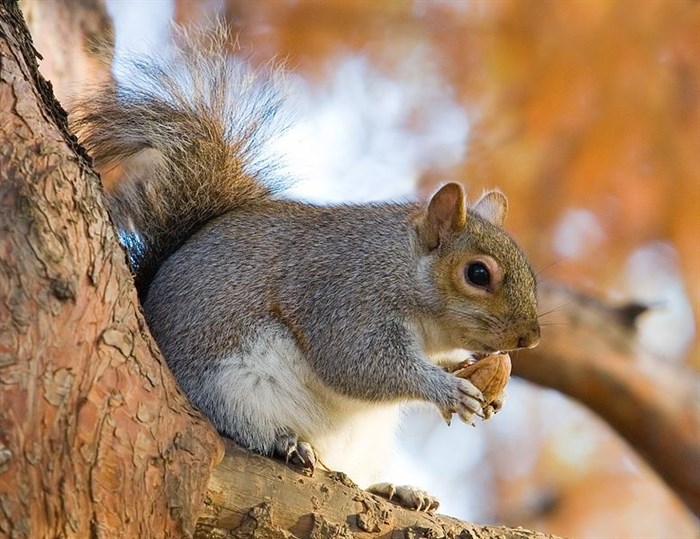
Eastern grey squirrel
Image Credit: SUBMITTED/David Iliff
June 13, 2017 - 11:30 AM
VERNON - Wildlife advocates are bemoaning the arrival of the invasive eastern grey squirrel in the North Okanagan.
In the past week, wildlife control expert Pete Wise has received two complaints of grey squirrels in Vernon.
“That’s brand new. I have never seen a grey squirrel in the City of Vernon until last week. I went ‘holy,’” Wise says.
The species has been established in Kelowna since at least 2012, and appears to be moving northward.
Karl Larsen, a professor at Thomson Rivers University, has been studying the invasive squirrel for years and says it’s already causing problems on Vancouver Island and the Lower Mainland — not to mention many other parts of the world.
The grey squirrel is listed as one of the top 100 invasive species in the world — a list that also includes plants.
“That’s a pretty notorious list to be on,” Larsen says.
Grey squirrels are known to have an effect on songbirds and other plants and animals. Not unlike rats, grey squirrels eat every type of fruit in the Southern Interior — including grapes — and are known to wreak havoc on gardens. They may also carry diseases — something which is currently being studied, Larsen says.
“I’d like to think I tried hard around 2012, 2013 to raise awareness. I went around and gave numerous talks. Unfortunately, I saw it right from the start — I said ‘history is going to repeat itself,’” Larsen says.
The grey squirrel made its debut in B.C. in the early 1900s when a small number were released into Stanley Park. The species later showed up on Vancouver Island, where it is now well established, and around 2004 sightings began popping up around Kelowna, Larsen says. The squirrels have also been spotted in Kamloops.
“It’s a little mortifying to see. We saw them spread on the Lower Mainland, saw them get established on Vancouver Island, and now they’re doing it again here in the Interior,” he says.
He says it was only a matter of time before the species started showing up in places like Vernon, and expects they’ll be in Penticton soon too.
“Nobody seems to be doing anything about it,” Larsen says. “Nobody is providing funds for dealing with invasive species on an automatic basis.”
EXAMPLE OF A BIGGER PROBLEM
Larsen says there used to be a federal fund for invasive species work, but it was cut under the Harper government. The provincial government has some initiatives for invasive species, but no automatic funds that can be deployed immediately for proactive, rather than reactive, work.
“We need a rapid attack invasive species fund,” he says. “We should be treating invasive species as we do a wildfire; when you see a fire break out on the hills of Kelowna or Vernon, nobody stops to think.”
“If we had something like that in place, we could prevent a lot of invasive species from getting established, and we could save a lot of money too.”
Unfortunately, something like the grey squirrel, with its bushy tail and shiny little eyes, fails to evoke the same threat level, Larsen says.
“We meet people in neighbourhoods who are enamoured with them and like them,” he says.
The full impacts of the grey squirrel are not known — and won’t likely be known until it is too late — but Larsen says there will undoubtedly be effects to native ecosystems. He says it’s unfortunate there isn’t more funding to study the species more closely.
“The problem is we’re doing it off the side of our desk. I can’t apply anywhere to get a good chunk of money to get some students working on it,” he says. “It’s a serious issue.”
He encourages people to contact their local politicians about the issue and ask for a greater government response.
“It might be too late for the grey squirrel, but it might give people the incentive to say ‘we better start looking at these things more seriously.’”
To contact a reporter for this story, email Charlotte Helston or call 250-309-5230 or email the editor. You can also submit photos, videos or news tips to the newsroom and be entered to win a monthly prize draw.
We welcome your comments and opinions on our stories but play nice. We won't censor or delete comments unless they contain off-topic statements or links, unnecessary vulgarity, false facts, spam or obviously fake profiles. If you have any concerns about what you see in comments, email the editor in the link above.
News from © iNFOnews, 2017